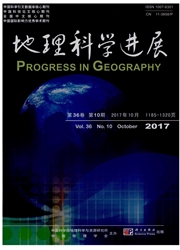

 中文摘要:
中文摘要:
经济地理学是地理学最重要的分支学科之一,在社会实践中发挥着重要作用。长期以来,中国经济地理学的发展可以用“以任务带学科”来概括,形成了具有中国特色的“实践派”经济地理学。近年来,中国经济地理学发展的突出特点表现为:规划导向、综合导向、“区域主义”、基于GIS的空间分析和可视化表达愈来愈普遍、国际化趋势明显。在研究方向上,除了传统优势领域得到强化外,出现了若干新的研究方向,包括功能区划分、能源与碳排放、全球化与外资外贸、生产性服务业、信息技术与互联网,以及农区地理与农户区位研究等。在人地系统与区域可持续发展,区域发展新因素与新格局,产业集群与产业集聚,全球化、跨国公司及外资,交通运输地理与空间组织,资源型城市及老工业城市转型,应对气候变化与低碳经济,海洋经济地理,地域空间规划方法等领域取得了较为显著的进展。在国家重大地域空间规划中发挥了重要的技术支撑作用,包括主体功能区划、东北振兴规划、西部大开发战略实施、中部崛起规划、资源枯竭型城市规划、生态区域建设规划,以及长江三角洲地区、京津冀地区、成渝地区等重点区域规划。未来经济地理学的发展既拥有机遇、也面临着挑战。在满足国家重大需求的同时,需要更加重视理论总结和人才培养。
 英文摘要:
英文摘要:
Economic geography, the study on the location, distribution and spatial organization of economic ac- tivities, is an important subfield of the discipline of geography, and has always been playing a significant role in understanding and solving the geographical and spatial issues of economic activities. Economic geography in China was affected not only by the country's economic and institutional conditions, but also by academic thoughts and research methods from Europe, America and the former Soviet Union. Its unique trajectory forms adistinct "practice-based" characteristic, and can be summarized as "promoting the discipline through fulfilling tasks", namely, the primary target and driving force of the discipline development are to satisfy the strategic de- mand of the country. At the same time, the practice tasks promoted the theoretical development. Chinese eco- nomic geographers' work is widely recognized by governments at all levels and the whole society in the country. The development of China's economic geography in recent years has the following characteristics. (1) Spatial planning at different scales is an important part of the research in economic geography (planning-oriented); (2) An increasing importance has been attached to the cross-disciplinary approach to the issue of economic geogra- phy, and to the cooperative study with other disciplines, especially with natural sciences (comprehensive guide). (3) Regional development and regional differences have become major study fields of economic geography (re- gionalism). (4) New techniques and simulation tools including GIS-based simulation analysis and visualization are more widely used (the application of new techniques). (5) China' s economic geographers are going out of the country and actively serve in international academic organizations (going towards "international"). The traditional research fields of economic geography have been greatly strengthened, at the same time, some new fields
 同期刊论文项目
同期刊论文项目
 同项目期刊论文
同项目期刊论文
 期刊信息
期刊信息
